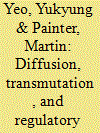| Srl | Item |
| 1 |
ID:
120987


|
|
|
|
|
| Publication |
2013.
|
| Summary/Abstract |
The recently installed leadership in Beijing has to carry forward the legacy of Deng Tsiaoping. He was a life-long communist and Chinese nationalist who espoused market economics, not for its own sake but to help the Party and China. China has strengths, like the power of the economy, the lack of a political opposition and a middle class that has been bought off. But wealth disparities, corruption and the environment will all need careful handling. Only Xi Jinping and Li Kegiang remain from the old Politburo. They and their colleagues must maintain control while meeting rising expectations.
|
|
|
|
|
|
|
|
|
|
|
|
|
|
|
|
| 2 |
ID:
106783


|
|
|
|
|
| Publication |
2011.
|
| Summary/Abstract |
Marketization and state restructuring are proceeding apace in China and Vietnam. China and Vietnam are not, however, converging upon the global regulatory model, even allowing for customary national variations. Rather, they are building up distinctive forms of regulatory regimes aiming to maintain the party-state's control over key state sectors, while at the same time integrating with the global economy and conforming to international norms and standards. This study argues that the regulatory model being adopted in Vietnam and China is the product of a specific kind of transition from a command to a market economy within an authoritarian political regime. While diffusion theories are of use in identifying external driving forces for the reform effort, these theories are of limited value for unveiling the dynamics of local contexts. Indigenous incentives, opportunity structures, and the experimental nature of public policy explain why, despite their exposure to global reform movements and commitment to multilateral institutions, China and Vietnam are likely to end up not with just a variety of the same regulatory regime, but a different one. The case of telecommunications regulation is used to illustrate this.
|
|
|
|
|
|
|
|
|
|
|
|
|
|
|
|